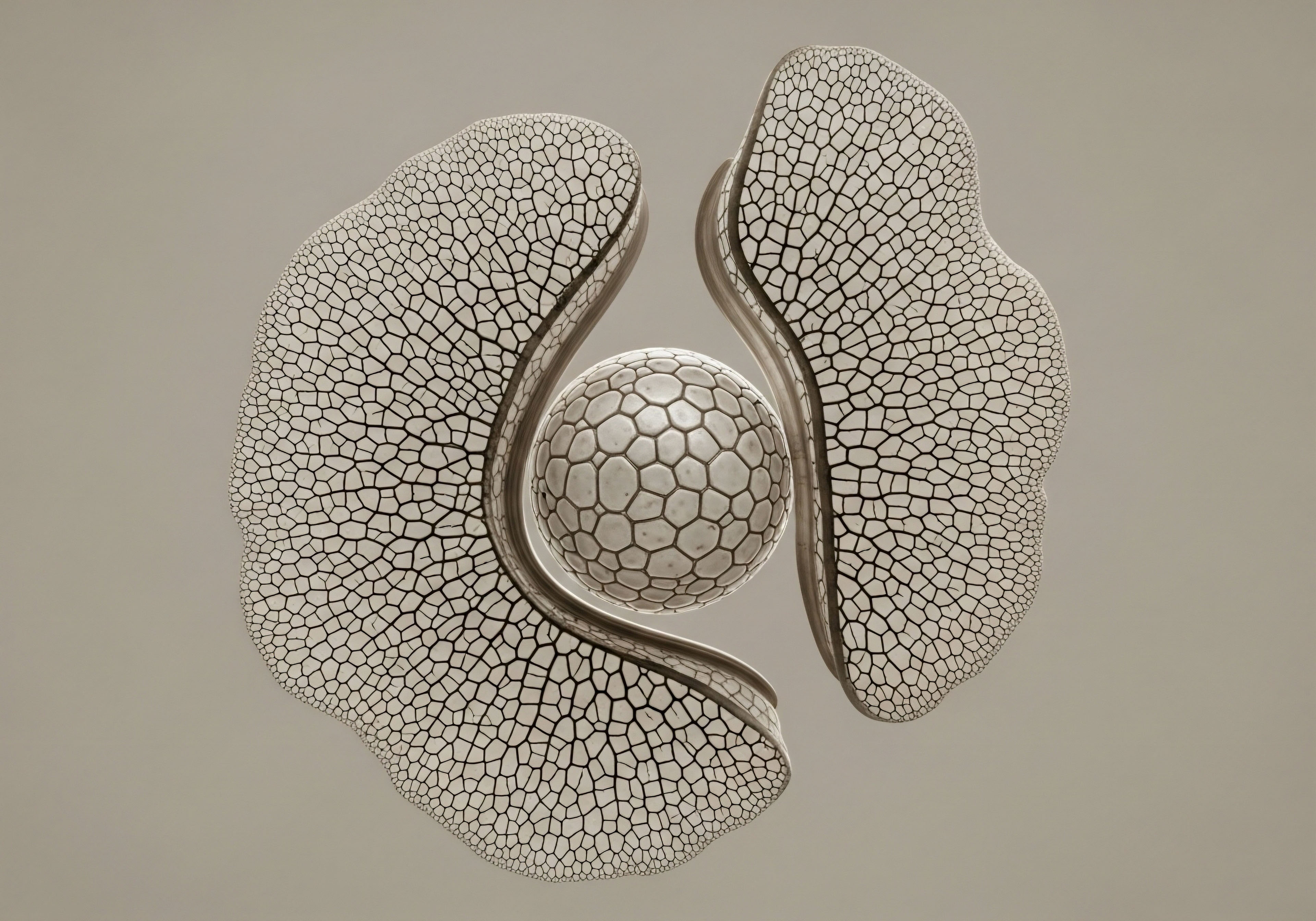

The Nocturnal Rebuild Cycle
The human body, a masterpiece of biological engineering, undergoes its most profound recalibration during the hours of darkness. Sleep transcends passive rest; it orchestrates an intricate symphony of hormonal signals and cellular repair processes, laying the foundation for peak daytime performance and sustained vitality. Dismissing this nightly regimen equates to neglecting the very operating system of one’s existence. The commitment to nocturnal optimization marks a fundamental shift in the pursuit of an upgraded biological state.
During deep sleep stages, the endocrine system initiates a cascade of restorative actions. Growth hormone, a potent anabolic agent, surges, driving tissue regeneration, muscle repair, and metabolic equilibrium. This crucial nocturnal release of growth hormone plays an essential role in maintaining overall tissue homeostasis and development.
Its influence extends to cellular health and the intricate repair machinery within the body. Simultaneously, the stress hormone cortisol experiences a natural inhibition, allowing the body to disengage from its diurnal vigilance and transition into a state of deep physiological restoration.
Melatonin, the pineal gland’s sentinel of darkness, plays a pivotal role in regulating these rhythms. Its production signals the onset of the body’s repair protocols, working in inverse synchronicity with cortisol to govern the sleep-wake cycle. A robust melatonin rhythm ensures proper alignment of the body’s internal clock, a biological imperative for health and longevity. Disturbances in this delicate balance compromise cellular function, accelerate markers of biological aging, and degrade cognitive acuity.
“Sleep loss is a significant, modifiable risk factor for metabolic syndrome, diabetes, and obesity, directly impacting the delicate balance of hormones like leptin and ghrelin.”
Metabolic health finds its bedrock in optimized sleep. Insufficient rest triggers a cascade of detrimental metabolic shifts, including impaired glucose regulation and altered appetite control. Research demonstrates a direct correlation between reduced sleep duration and quality with an increased risk of obesity and type 2 diabetes.
Hormones governing hunger and satiety, specifically leptin and ghrelin, experience adverse fluctuations when sleep is compromised, leading to increased subjective hunger and metabolic dysregulation. This physiological vulnerability underscores sleep’s profound influence on body composition and long-term health trajectories.
The connection between nocturnal recalibration and longevity is irrefutable. Consistent, high-quality sleep patterns, characterized by ample slow-wave sleep, correlate directly with extended human healthspans and favorable lipid profiles. Conversely, chronic sleep disturbances contribute to accelerated biological aging, impacting telomere length and cellular senescence, the very hallmarks of the aging process. The night is not merely a pause; it is a meticulously programmed sequence for extending one’s vital years.


Precision Tuning Your Nightly Chemistry
Mastering nocturnal recalibration demands a precise, systems-engineering approach. This involves a multi-pronged strategy, integrating environmental controls with targeted biochemical support. The goal centers on optimizing the intricate feedback loops governing your sleep architecture, ensuring every hour spent in darkness contributes to maximum regeneration.

Environmental Control Systems
Your sleep environment exerts a powerful influence on hormonal release and circadian alignment. Strategic adjustments transform your bedroom into a sanctuary of biological optimization.
- Light Suppression ∞ Eliminate all sources of artificial light, especially blue light, at least two hours before your intended sleep time. Blue light exposure suppresses melatonin production, disrupting the natural signal for sleep onset. Install blackout curtains and utilize dim, red-spectrum lighting for evening activities.
- Thermal Regulation ∞ Maintain a cool sleeping environment, ideally between 60-67 degrees Fahrenheit (15-19 degrees Celsius). A slight drop in core body temperature signals the body to initiate sleep and promotes deeper sleep stages.
- Sound Attenuation ∞ Create a silent space. Use earplugs or a white noise generator to block out disruptive sounds that fragment sleep architecture, preventing access to restorative deep sleep cycles.

Biochemical Augmentation Protocols
Beyond environmental controls, specific biochemical interventions can fine-tune your nocturnal physiology, enhancing natural hormone production and sleep quality. These interventions serve as intelligent signals to your body’s internal machinery.
Peptide Science for Sleep Enhancement ∞ Peptides, as signaling molecules, offer a sophisticated means to influence the body’s natural processes. Certain peptides directly support sleep architecture and hormonal balance.
- Sermorelin ∞ This peptide acts as a growth hormone-releasing hormone (GHRH) analog, stimulating the pituitary gland to release natural growth hormone in a pulsatile, physiological manner. Enhanced nocturnal GH release contributes to improved sleep quality, tissue repair, and recovery.
- Epitalon ∞ Known for its anti-aging properties, Epitalon also normalizes circadian rhythms by stimulating endogenous melatonin production. This supports a more regular sleep-wake cycle and deeper, more restorative rest.
- Delta Sleep-Inducing Peptide (DSIP) ∞ This natural neuropeptide directly aids in regulating the brain’s sleep mechanisms, promoting deeper, uninterrupted sleep by reducing nighttime awakenings. DSIP works in harmony with the body’s intrinsic rhythms, enhancing natural sleep stages without disruption.
Nutritional Timing and Micronutrient Support ∞ The timing of nutrient intake impacts circadian synchronization. Avoid heavy meals close to bedtime. Incorporate micronutrients known to support sleep and hormonal balance. Magnesium, for instance, plays a role in numerous biochemical reactions, including those involved in sleep regulation and neurotransmitter function. Glycine, an amino acid, has demonstrated properties that promote sleep by lowering core body temperature and influencing neurotransmitter activity.
“Peptides such as Sermorelin and Epitalon represent intelligent tools for recalibrating the body’s intrinsic growth hormone and melatonin rhythms, thereby elevating sleep quality and accelerating cellular regeneration.”
Consider a structured approach to evening supplementation. This supports the natural decline of cortisol and the rise of melatonin, facilitating a smoother transition into restorative sleep. A consistent pre-sleep routine, incorporating practices that promote relaxation, further reinforces these biochemical signals. This systematic optimization transforms your night into a potent engine for biological renewal.


The Enduring Rhythm of Transformation
The recalibration of nocturnal physiology yields a phased, yet enduring, transformation. This is not an instantaneous change, but a progressive re-engineering of your biological clock, delivering compounding returns over time. Expect the initial shifts to manifest as subtle improvements, deepening into profound changes with consistent application.

Immediate Benefits ∞ Days to Weeks
Within the initial weeks, individuals commonly report enhanced energy levels, improved mental clarity, and a noticeable uplift in mood. The reduction in nocturnal cortisol and the rise in restorative hormones translate directly into a more robust physiological state during waking hours. You might observe a quicker sleep onset and fewer nighttime awakenings.
These early indicators confirm the initial alignment of your circadian rhythms and the activation of foundational repair mechanisms. Many individuals report feeling years younger, with increased muscle definition and improved recovery after workouts, within two to four weeks of initiating targeted protocols.

Sustained Optimization ∞ Months to Years
As you maintain your nocturnal optimization protocols, the benefits extend into deeper, more systemic changes. Over several months, the body consolidates these gains, building a resilient platform for sustained performance. Expect improvements in body composition, with enhanced lean muscle mass and more efficient fat metabolism. Skin texture and hydration improve, reflecting accelerated cellular repair and collagen production. Cognitive function sharpens, memory recall improves, and emotional stability becomes a consistent state.
The long-term commitment to nocturnal recalibration fundamentally alters your trajectory through time. It fosters a robust immune system, reduces chronic inflammation, and enhances cellular resilience against age-related decline. This proactive stance redefines aging, transforming it from a passive decline into an active process of mastery and continuous upgrade. The enduring rhythm of transformation becomes your new biological standard, a testament to intentional, science-backed living.

Claiming Your Nocturnal Dominion
The quest for peak human performance and sustained vitality finds its ultimate battleground in the night. The hours of darkness present a profound opportunity for biological engineering, a period when the body rebuilds, repairs, and recalibrates its most vital systems.
This guide illuminates a path toward claiming dominion over your nocturnal physiology, transforming sleep from a mere necessity into a powerful, strategic advantage. It involves a precise understanding of hormonal rhythms, a meticulous approach to environmental controls, and a judicious application of advanced biochemical support. Your biological destiny awaits your command, redefined by the disciplined pursuit of optimal nightly restoration.



